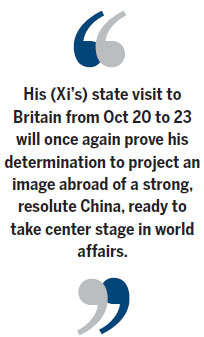For years, China maintained a steady presence at the United Nations.
But as it has emerged as a significant economic and military power on the world stage, things have changed. China is on track to become one of the biggest contributors financially to the UN behind Britain and France and announced a huge rise in its manpower contribution to UN peacekeeping operations.
President Xi Jinping made a dramatic pledge during his speech to the UN General Assembly in September, revealing the creation of a permanent peacekeeping of 8,000 personnel for UN operations, $100 million for the African Union to help its own peacekeeping efforts, and a $1 billion donation to the UN generally for "peace and development".
In addition, China will start training 5,000 potential peacekeepers from other member states.

This, say observers, is the most concrete sign yet that China, now the world's second-largest economy, is taking its rightful place in the world order.
Xi himself is spearheading China's diplomatic drive. A state visit to the United States in September was just the latest in a dizzying list of foreign visits since he became president in March 2013.
He has been to Russia twice, Tanzania, South Africa, the Democratic Republic of Congo, Indonesia, Western Europe, South Korea, Brazil, Venezuela, Cuba, India, Australia, Fiji, Pakistan and Kazakhstan.
His state visit to Britain from Oct 20 to 23 will once again prove his determination to project an image abroad of a strong, resolute China, ready to take center stage in world affairs.
That's backed by a sustained campaign against corruption at home, and backing for economic reforms whilst at the same time reinforcing respect for the Party and the rule of law.
So how do China's partners on the world stage view the latest image of the country?
I think it's fair to say he won a few more friends in the US, but there's still lingering suspicion in political and business quarters there which has led to efforts by some Chinese companies to expand their businesses there being blocked.
The UK, it would seem, is a different kettle of fish. This country has had a turbulent relationship with China since the 19th century, weathering the effects of war, colonialism, diplomatic turmoil, and trade disputes.
That seems to have changed. Chinese and British friends of mine all make it clear that whatever the differences, there's always been a mutual interest.

One blot on the landscape was the then British crown colony of Hong Kong, but ever since the territory's peaceful transition back to Chinese sovereignty and the status of Special Administrative Region of the People's Republic of China, things have improved dramatically.
Chinese investment here is welcome - China's proposed investment in the UK's nuclear industry hasn't attracted any adverse comment, and the list goes on. You get the feeling Chancellor George Osborne was laying out a very large welcome mat for Xi when he was in China last month. The announcement of 52 separate deals gives you an idea of how well that visit went down.
Britain's government officials, ever pragmatic, are well disposed to laying out a genuine red carpet. As I have said before, Xi will find it a bit like pushing at an open door.
China's growing openness with the rest of the world is also a huge factor.
Britain's love affair with China is pretty broad - whether it's the culture on display in various museums, the effect on furniture or porcelain, or the influence of Chinese cuisine - it's going to continue.
China is on most people's list of places to visit, and thousands of Chinese visitors are welcomed here each year, whether for leisure, study or business.
Xi's visit can only cement that bond.
The author is managing editor of China Daily Europe, based in London. Contact the writer at chris@mail.chinadailyuk.com